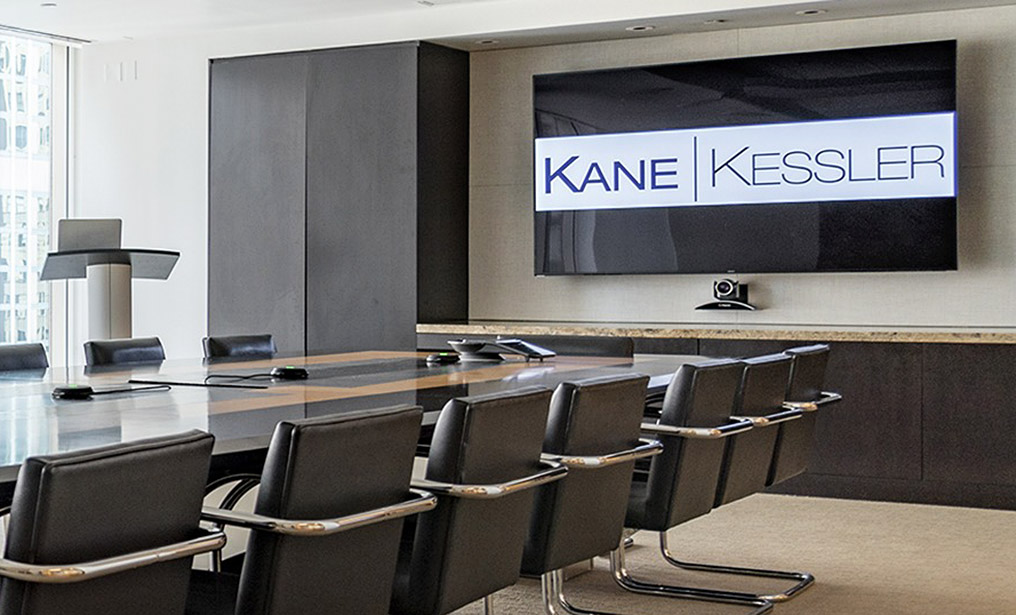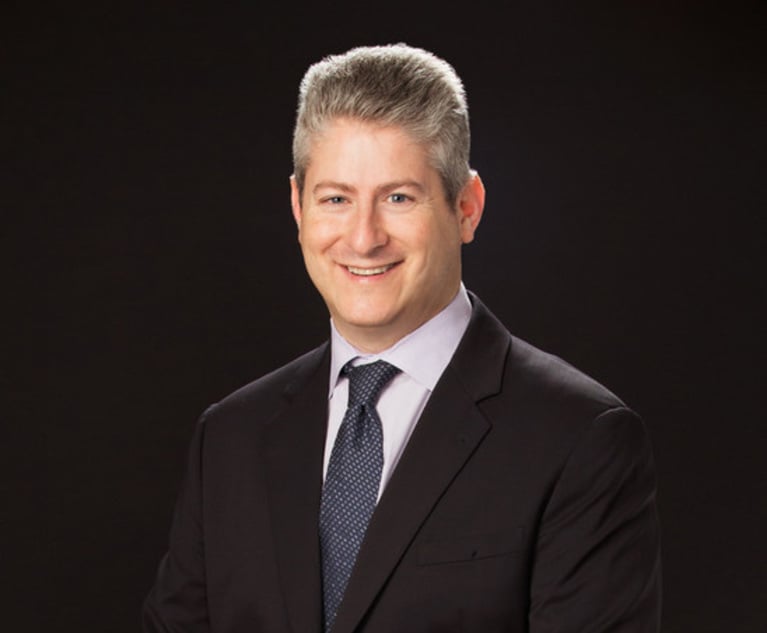Lawsuit Alleging Misconduct Against Kane Kessler Is Revived By 2nd Circuit
The panel found U.S. District Judge Paul Engelmayer misinterpreted the reading of a state law when he dismissed the attorney misconduct complaint against the law firm Kane Kessler.
May 20, 2019 at 01:56 PM
3 minute read
 Photo: Kane Kessler/Facebook
Photo: Kane Kessler/Facebook
A misconduct claim against Kane Kessler, a New York City-based business litigation law firm, was revived by the U.S. Court of Appeals for the Second Circuit on Monday, which reversed the dismissal of attorney misconduct claims under New York's judiciary law.
The panel—composed of Circuit Judges José Cabranes and Peter Hall, and U.S. Judge Timothy Stanceu of the U.S. Court of International Trade, sitting by designation—issued a summary order remanding the suit brought by Oorah Inc., a nonprofit focused on Jewish family services. Oorah's federal claims were a direct outgrowth of state suit brought against a prepaid phone card vendor, Covista Communications Inc., along with Kane Kessler, associate Gerard Schiano-Strain, and other connected parties.
Oorah's legal action alleged Covista was assisted in frustrating the nonprofit's attempts to collect commissions it was contractually owed by referring customers to Covista as part of a fundraising effort. Oorah claimed Kane Kessler and Birch Communications, which acquired Covista, helped manipulate and destroy key records and made sure assets were sold off before Oorah could enforce judgment.
Oorah prevailed in the underlying state action—a fact that framed the decision by U.S. District Judge Paul Engelmayer of the Southern District of New York to dismiss the nonprofit's attorney misconduct claims.
The district court's reading of § 487 of the state judiciary code required that claims be brought in the action where the alleged attorney misconduct occurred, “unless the misconduct is part of a broader fraudulent scheme.”
As the panel noted, the distinction at issue was, under § 487, whether or not the party seeking relief was successful. If that was ultimately the case, the panel said, the party “may bring a separate, plenary action alleging a violation” under state attorney misconduct law. Engelmayer's reading, the panel found, was valid specifically when the party seeking relief failed in the underlying action.
The district court erred in concluding that Oorah sought to “collaterally attack” a judgment that didn't go its way, rather than attempt to recover damages for the additional legal costs incurred “as a result of Kane Kessler's alleged misconduct.”
“In sum, while the court where the alleged misconduct occurred may be better positioned than a federal court sitting under diversity jurisdiction to assess the merits of a § 487 claim, the District Court misread New York state law to require a prevailing party to file its § 487 claim in the pending underlying state action,” the panel stated.
Oorah was represented on appeal by Storch Amini name attorney Steven Storch.
“We respectfully disagree with the Court of Appeals' decision,” said A. Michael Furman of Furman Kornfeld & Brennan, which represented Kane Kessler in the case. “Kane Kessler vigorously denies the allegations made by the plaintiff, and looks forward to the dismissal of this unwarranted lawsuit.”
Related:
Attorney Charged With $600K Theft From Harlem Church Resigns, Will Pay Restitution
Collen IP Out After Sanctions Motions Filed in Omega Counterfeit Suit
This content has been archived. It is available through our partners, LexisNexis® and Bloomberg Law.
To view this content, please continue to their sites.
Not a Lexis Subscriber?
Subscribe Now
Not a Bloomberg Law Subscriber?
Subscribe Now
NOT FOR REPRINT
© 2025 ALM Global, LLC, All Rights Reserved. Request academic re-use from www.copyright.com. All other uses, submit a request to [email protected]. For more information visit Asset & Logo Licensing.
You Might Like
View All

Cooley Promotes NY Office Leader to Global Litigation Department Chair

NY Judge Resigns After Avoiding Jury Duty by Telling Court He Couldn't Be Impartial

Charlie Javice Jury Will Not See Her Texts About Elizabeth Holmes
Trending Stories
- 1Thursday Newspaper
- 2Public Notices/Calendars
- 3Judicial Ethics Opinion 24-117
- 4Rejuvenation of a Sharp Employer Non-Compete Tool: Delaware Supreme Court Reinvigorates the Employee Choice Doctrine
- 5Mastering Litigation in New York’s Commercial Division Part V, Leave It to the Experts: Expert Discovery in the New York Commercial Division
Who Got The Work
J. Brugh Lower of Gibbons has entered an appearance for industrial equipment supplier Devco Corporation in a pending trademark infringement lawsuit. The suit, accusing the defendant of selling knock-off Graco products, was filed Dec. 18 in New Jersey District Court by Rivkin Radler on behalf of Graco Inc. and Graco Minnesota. The case, assigned to U.S. District Judge Zahid N. Quraishi, is 3:24-cv-11294, Graco Inc. et al v. Devco Corporation.
Who Got The Work
Rebecca Maller-Stein and Kent A. Yalowitz of Arnold & Porter Kaye Scholer have entered their appearances for Hanaco Venture Capital and its executives, Lior Prosor and David Frankel, in a pending securities lawsuit. The action, filed on Dec. 24 in New York Southern District Court by Zell, Aron & Co. on behalf of Goldeneye Advisors, accuses the defendants of negligently and fraudulently managing the plaintiff's $1 million investment. The case, assigned to U.S. District Judge Vernon S. Broderick, is 1:24-cv-09918, Goldeneye Advisors, LLC v. Hanaco Venture Capital, Ltd. et al.
Who Got The Work
Attorneys from A&O Shearman has stepped in as defense counsel for Toronto-Dominion Bank and other defendants in a pending securities class action. The suit, filed Dec. 11 in New York Southern District Court by Bleichmar Fonti & Auld, accuses the defendants of concealing the bank's 'pervasive' deficiencies in regards to its compliance with the Bank Secrecy Act and the quality of its anti-money laundering controls. The case, assigned to U.S. District Judge Arun Subramanian, is 1:24-cv-09445, Gonzalez v. The Toronto-Dominion Bank et al.
Who Got The Work
Crown Castle International, a Pennsylvania company providing shared communications infrastructure, has turned to Luke D. Wolf of Gordon Rees Scully Mansukhani to fend off a pending breach-of-contract lawsuit. The court action, filed Nov. 25 in Michigan Eastern District Court by Hooper Hathaway PC on behalf of The Town Residences LLC, accuses Crown Castle of failing to transfer approximately $30,000 in utility payments from T-Mobile in breach of a roof-top lease and assignment agreement. The case, assigned to U.S. District Judge Susan K. Declercq, is 2:24-cv-13131, The Town Residences LLC v. T-Mobile US, Inc. et al.
Who Got The Work
Wilfred P. Coronato and Daniel M. Schwartz of McCarter & English have stepped in as defense counsel to Electrolux Home Products Inc. in a pending product liability lawsuit. The court action, filed Nov. 26 in New York Eastern District Court by Poulos Lopiccolo PC and Nagel Rice LLP on behalf of David Stern, alleges that the defendant's refrigerators’ drawers and shelving repeatedly break and fall apart within months after purchase. The case, assigned to U.S. District Judge Joan M. Azrack, is 2:24-cv-08204, Stern v. Electrolux Home Products, Inc.
Featured Firms
Law Offices of Gary Martin Hays & Associates, P.C.
(470) 294-1674
Law Offices of Mark E. Salomone
(857) 444-6468
Smith & Hassler
(713) 739-1250






